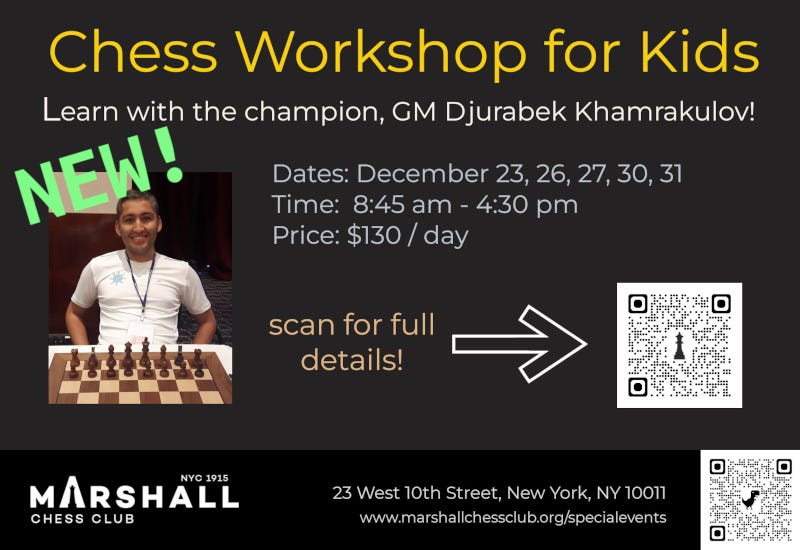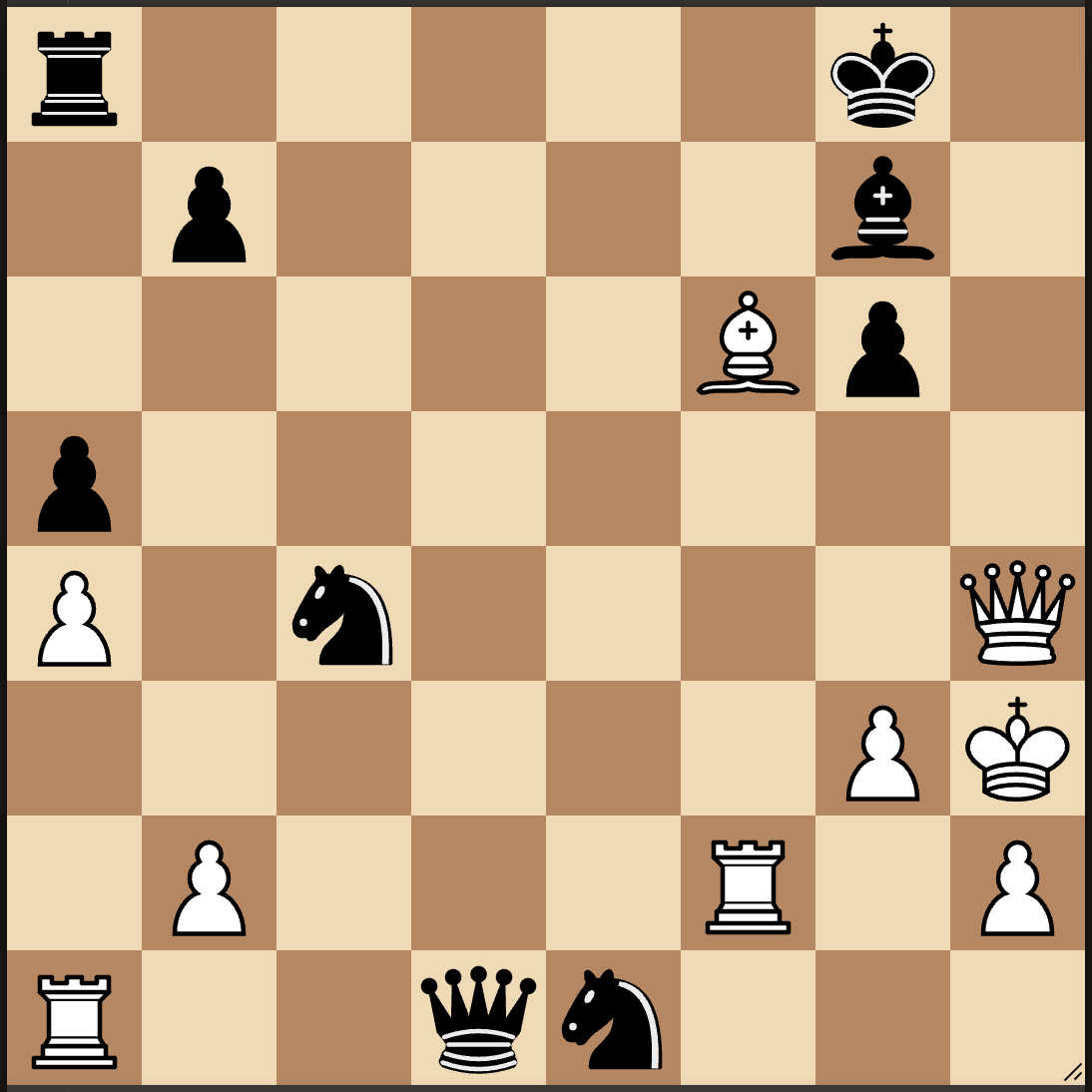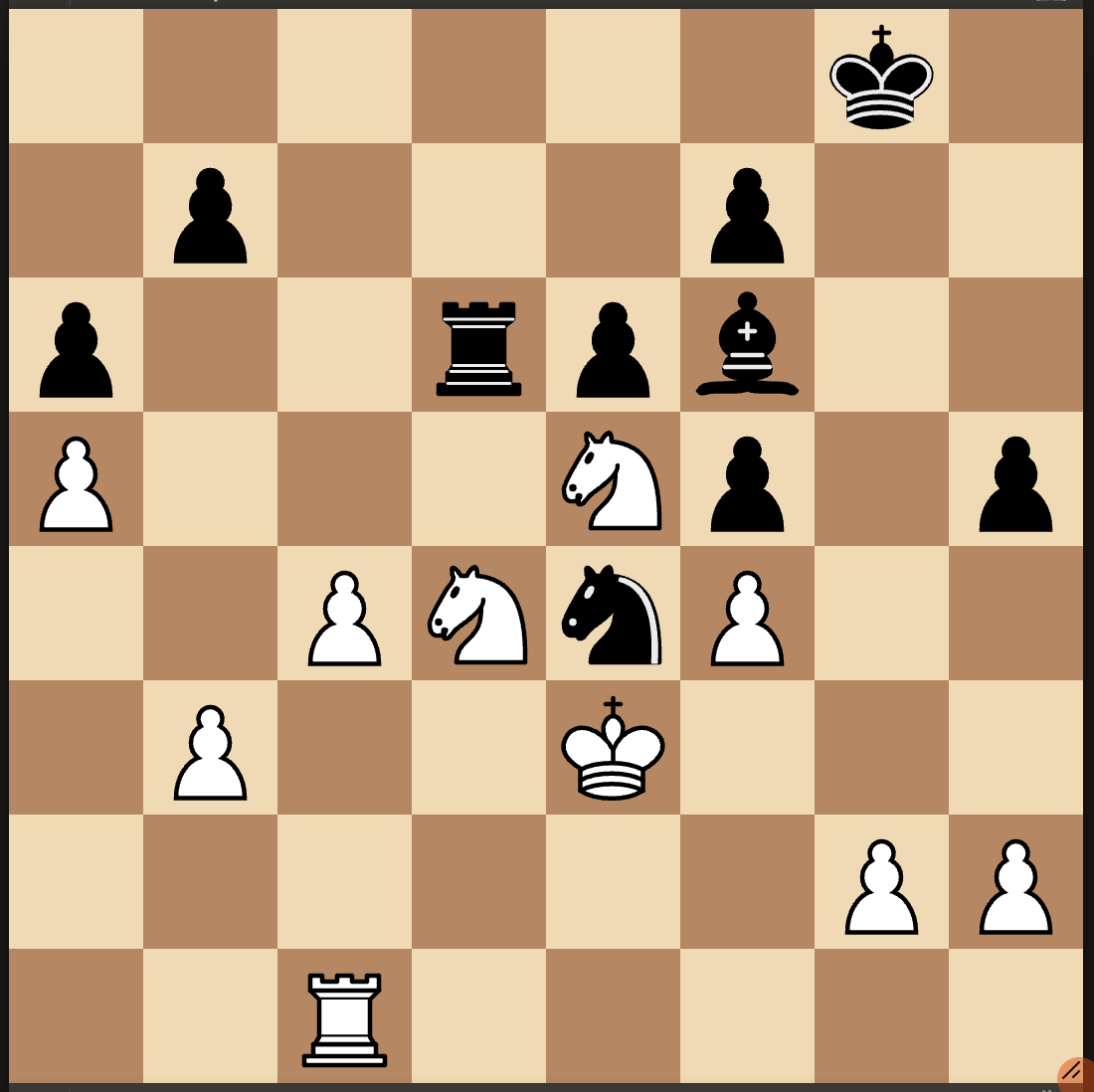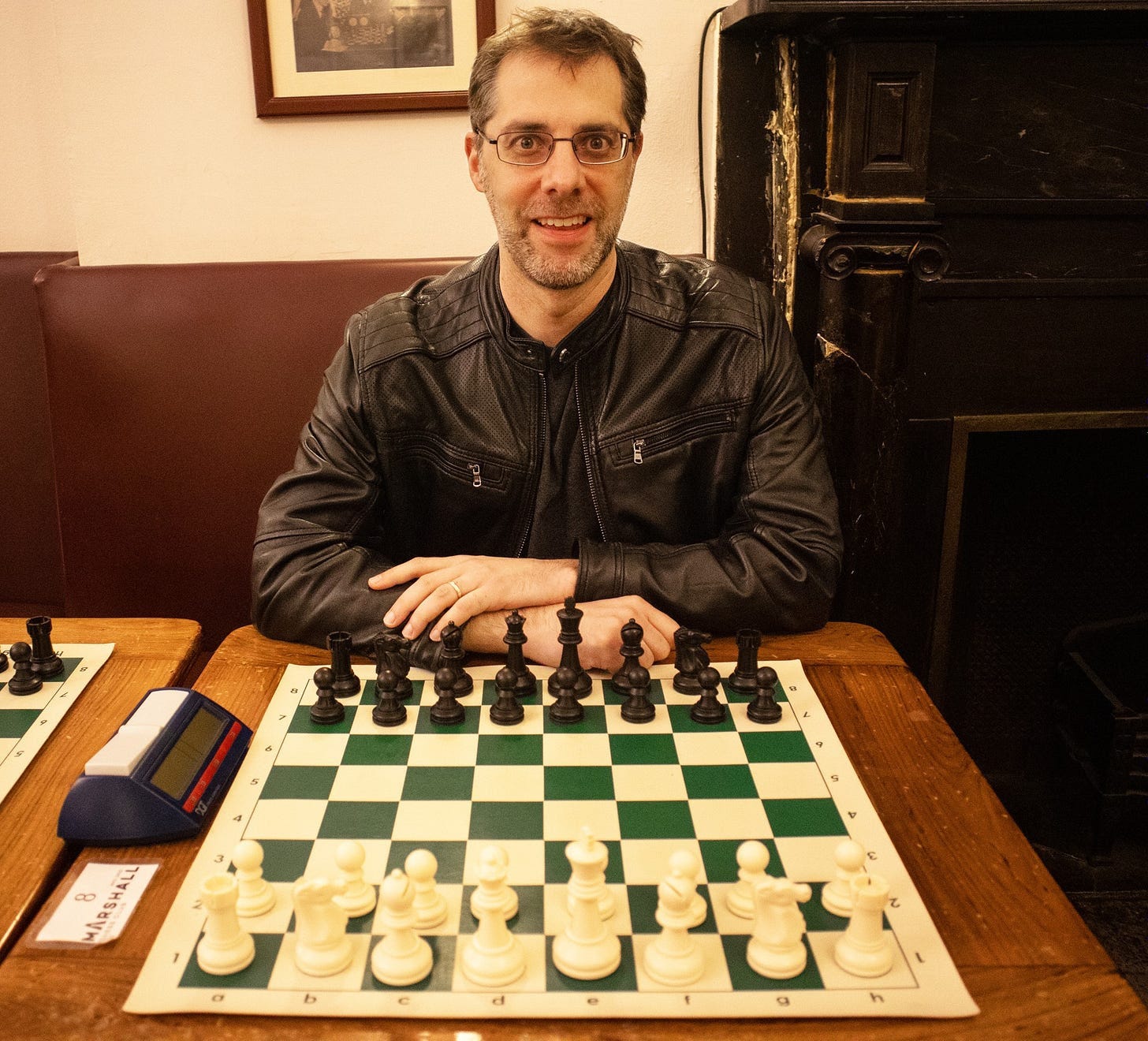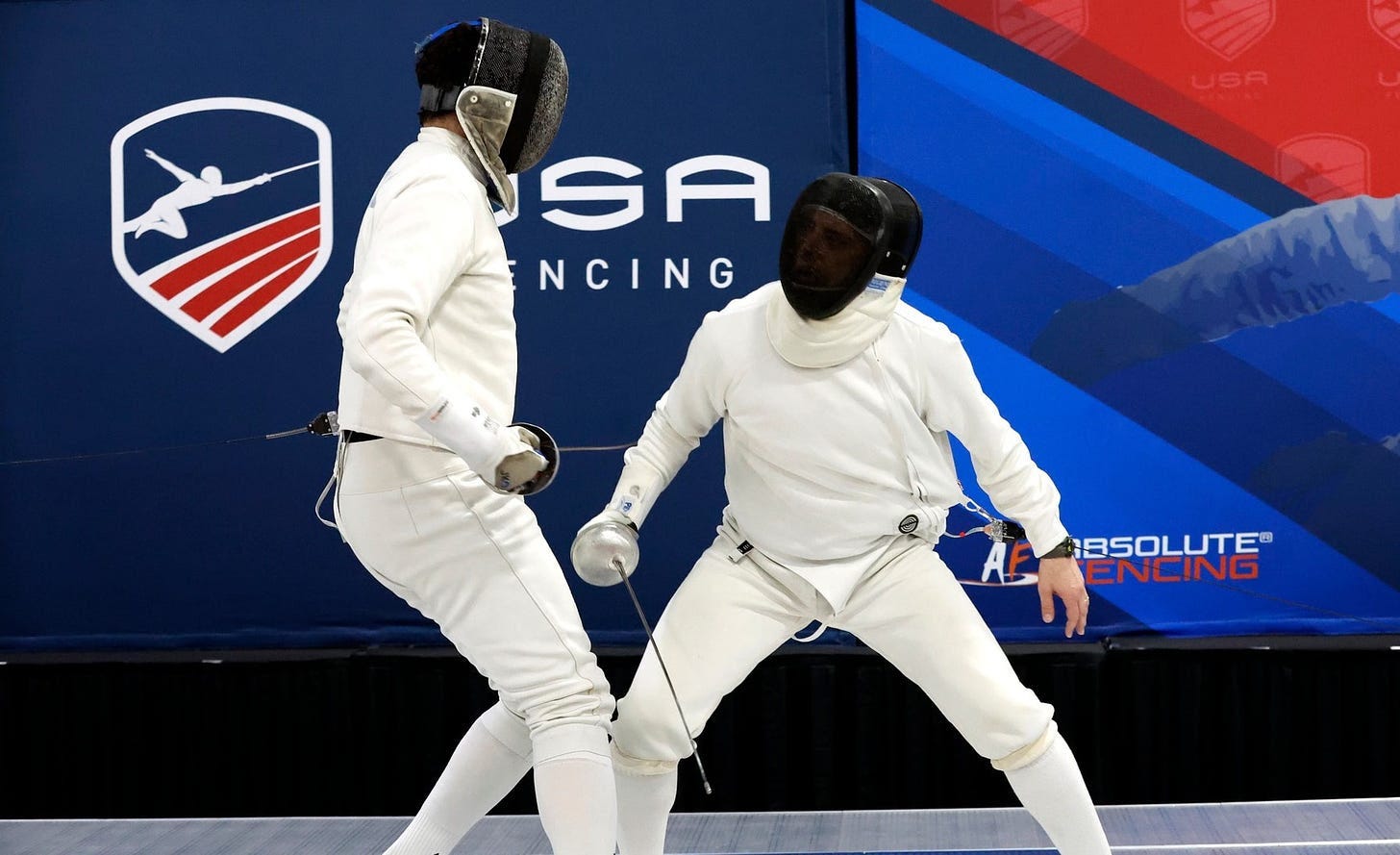In This Issue: From The Skittles Room Mona Karff Memorial & Senior Championship Games Analyzed, by GM Lenderman Across the Table, with Noah Zucker Chess Toons En Passant Problems, Problems, curated by Alexander George Editor's Note
Welcome back, fellow chess players, to this edition of the Marshall Chess Club's fortnightly bulletin, The Marshall Spectator.
Dear Marshall Members,
This month we reached a milestone in the club's prestigious history. We have surpassed 1500 members and counting. As of today we have 1512 Marshall members. This is a reflection of the popularity and success of chess in New York City and across the country. I would also like to take this opportunity to request that you continue to do your part to keep the club clean, organized, and welcoming to everyone. Your club serves as a safe and sacred place for chess players of all ages to come together and demonstrate their appreciation and value for the beautiful game. I thank you for your commitment to the preservation and legacy of the club.
Happy holidays to you all!
Carlos Chavez
Last week we held our annual Mona Karff Memorial Women’s Championship and Senior Championship concurrently. Game commentary from the event can be seen on our youtube channel, and the games can reviewed here for the women’s event and here for the Seniors Event.
Congratulations to the 2024 Club Champions! GM Irina Krush returned to defend her title as the 2023 Women’s MCC Champion, again winning the Mona Karff Memorial to hold onto the title for one more year. GM Michael Rohde won the 2024 MCC Senior Championship.
Looking ahead, the 108th annual Edward Lasker Memorial and Marshall Chess Club Championship will take place December 12-15, culminating with the crowning of the 2024 club champion.
Kyla Zhao visited the Marshall Chess Club on November 15 and 19. The first time, she delivered opening remarks to kick off the 2024 Marshall Women’s Championship (congratulations to GM Irina Krush for winning!). The second time, she gave a book talk about her recent book, May the Best Player Win, her third novel. The talk was moderated by Executive Director Carlos Chavez, who prepared several insightful questions.
It’s a family-friendly tale that’s comparable to the T.V. series The Queen’s Gambit. As two-time U.S. Women’s Champion Carissa Yip wrote about the young-adult novel that features a female protagonist, “This book is a game-changer for readers of all ages, regardless of whether you play chess! May the Best Player Win captures the thrill of competition, the weight of expectations, and the sting of naysayers.”
Check out this adorable picture from her book-signing after the talk, with the kids at the front of the line!
Looking ahead, we have several other exciting events on the calendar including a book event for the late GM Miron Sher’s book “Dream Moves,” as well as a holiday party.
In scholastic news, the Marshall Chess Club is excited to announce our next offsite scholastic tournament in partnership with the Speyer Legacy School. This event will be held on January 12, 2025. You can register your child in advance here.
Here are some details of the event:
Format: 4 player Quad sections - Time Control: G/45, d5 Entry Fee: $50 Members; $65 Nonmembers - Prize: $20 Amazon gift card to Quad winners Location: The Speyer Legacy School, 925 9th Ave, New York, NY 10019. (Please don’t come to the club!)
Round Times: CHECK IN: 8:45 - 9:15 AM Rd1 10:00AM Rd2 12:00PM Rd3 2PM- Please note these round times are approximate. Rounds will begin approximately 15 minutes after the conclusion of the previous round. All guests must be out of the building by 4:30 PM.
Other details: This event is only open to scholastic players (K-12) and invited adult players. This is not a drop off event, parents and guardians are responsible for their child for the whole duration of the tournament. Team rooms are available upon request!
Looking ahead to the winter, we are happy to announce a continuation of our Grandmaster Chess Classes with a Winter Chess Class with Grandmaster Djurabek Khamrakulov. For further details or to register for the classes please visit our website. We are also thrilled to launch a new series of Chess Workshops for Kids at our historic club. Registration dates for all camps this year are up. Our camps will be open to all scholastic members and we will cap each camp date at 40 kids. The entry fee is $130 per camp session, and will be led by GM Djurabek Khamrakulov. We look forward to inviting special guests for simuls and lectures.
The club will provide lunch (chipotle/ pizza) and snacks throughout the day, as well as park play if the weather permits. We will also have a camp “piggy bank” in which a portion of registration fees will go into for each camp day. Campers who participate in at least 4 camp days this year will be eligible for a free super tournament next year with prizes (up to $2000 in value!) in the form of private lessons, trophies, merchandise, and much more.
Over the last two weeks we have had a plethora of events for our members to play in.
The Jerry Simon Memorial and Amateur Championship concluded on November 24 and had a remarkable turnout, with 99 players registered. Andrew Colwell and Tim Shvarts won the event, scoring 4.5 out of 5 to win $1,600 and a free entry to our club championship each. Misha Raitzin and Naveen Paruchuri also won a free entry to the club championship, as well as a $162.50 prize. Justin Dalhouse, Nkosi Nkululeko, Joseph Otero, Conor Liao, and Robert Olsen. Ryan Chen also won a $162.50 prize for a 4 out of 5 score. Finally, the following 3 players won $100 for their 3.5 out of 5 score: Sawyer Sarwar, Hunter Quirk, and Matt Biancuzzo.
The Rated Beginner Open on November 24 had 44 players registered and was won by the following 4 players who scored a perfect 3 out of 3 to win $134.50 each: Jackson Shire, Lance Wolf, Andy Fu, and Benjamin Abramowitz.
The Under 2000 Morning Action on November 23 had 66 players registered and concluded with the following 4 players winning $144.50 for their perfect 3 out of 3 score: Neal Thio Hong, Ateeq Panjwani, Bryson Wolf, and Jephson Mathew. Arnav Abichandani won a class prize of $248 for his 2.5 out of 3 score.
The Morning Masters on November 23 had 8 players registered and was won by Miles Hinson, who scored 2.5 out of 3 to win $60, while IM Jay Bonin, Evan Kauffmann, and Ehtan Kozower shared in the remaining prize funds winning $13.33 each for their 2 out of 3 score.
The Wesley Hellner Action on November 21 had 39 players registered and was won by IM Kevin Wang, FM Marcus Miyasaka, and NM Bryan Weisz who scored 3.5 out of 5 to win $103.33 each. Alec Hyunmook Choi scored 3 out of 4 to win $75, while Joshua Block, Arvie Valen Lozano, and Wyatt Wong shared in the remaining prize funds, winning $24 each for their 3 out of 4 score.
The 2024 Senior Championship that concluded on November 17 had 21 players registered and was won by GM Michael Rohde, who scored 4 out of 5 to win the $450 first place prize. The following 6 players scored 3.5 out of 5 to share in the remaining prize funds, winning $75 each: IM Sal Matera, GM Sergey Kudrin, Akram Shehata, IM Jay Bonin, Eric Fleischman, and FM Asa Hoffmann.
The 2024 Mona Karff Memorial that concluded on November 17 had 26 players registered and was won by the defending champion, GM Irina Krush, who scored a near perfect 4.5 out of 5 to win the $2,500 first place prize. Jasmine Su, Dhruthi Rao, and Nicole Zlotchevsky scored an impressive 4 out of 5 to win $750 each, while Fiona Tushman scored 3 points to win a class prize of $250.
The Rated Beginner Open on November 17 had 44 players registered and was won by the following 4 players who scored a perfect 4 out of 4 to win $134.50 each: Jackson Shire, Lance Wolf, Andy Fu, and Benjamin Abramowitz.
The Under 2000 Morning Action on November 16 had 60 players registered and finished with the following 5 players winning $105 for their perfect 3 out of 3 score: Daniel Yassky, Davin Chen, John Silva, Richard Koppenaal, and Avin Pawar. The following 7 players shared in a class prize, winning $32.14 each for their 2 out of 3 score: Rico He, Lucas Wu, Alexei Kumar, Blake Herman, Myra Nigam, Ivan Fedosov, Liam McPeake.
The Morning Master on November 16 had 4 players registered, and was won by William Aepli who scored 2 out of 3 to win $30, while Miguel Garcia and Daguy Vaval scored 1.5 out of 3 to win $10 each.
The Wesley Hellner Action on November 14 had 56 players registered and was won by IM Joseph Zeltsan, who scored a perfect 4 out of 4 to win the first place prize of $207. IM Alexander Katz, IM Kevin Wang, Justin Dalhouse, and Daniel Wang scored 3.5 out of 4 to win $86.50 each. Samuel Waranch and Misha Raitzin scored 3 out of 4 to share in a class prize, winning $52 each.
The Sunday Game 50 Open on November 10 had 36 players registered and was won by Elliot Goodrich, who scored a perfect 4 out of 4 to win the $216 first place prize. Jeremy Yoon and IM Justin Sarkar scored 3.5 out of 4 to win $72, while the following 7 players won $15.43 for their 2.5 score: Armaan C Jain, Hudson Wong, Bryant Chen, Jan Buzek, Thomas Egelhof, Winston Ruiying Chen, and Jonathan Tieng.
The Sunday Game 50 Under 1600 on November 10 had 48 players registered and was won by Jacob Modzelewski, who scored a perfect 4 out of 4 to win the clear first place prize of $282. Sebastian Goodrich scored 3.5 to win $188, while the following 4 players won $33.25 for their 3 out of 4 score: Wythe Wang, Myra Nigam, Joshua Tieng, and Gabe Bencosme-Lee.
The Rated Beginner Open on November 10 had 59 players registered and concluded with 6 perfect scores. The following 6 players scored a perfect 3 out of 3 to win $123 each: Max Liu, Logan Shmulenson, Dordzi Mukabenov, Nate Wyeth, Nicholas Licalzi, and Adrian Nardelli.
We look forward to seeing you at the club soon!
Annotated Games by GM Aleksandr Lenderman
This year, the Senior Championship boasted a very strong field, including two GMs, several IMS and FMs, and a lot of masters. It was won by GM Michael Rohde with 4/5, ahead of six players with 3.5/5. Michael played a very smooth tournament, winning three excellent games in rounds 1-3, taking a bye in round 4, and making a quick draw in the last round from a position of strength, guaranteeing himself at least a share first, which turned into a clear first when the game on board 2 between Eric Fleischman and Jay Bonin ended in a draw. My favorite game of Michael’s was his first-round win, which I found to be very clean and instructive.
You can play through all of the games in this article with annotations here.
Solomon, Ciprian vs. Rohde, Michael
1. d4 Nf6 2. c4 d6 A pet line of Michael, in which we have had several games.
3. Nc3 Nbd7 4. Nf3 e5 5. e3 (5. e4 Is more principled.) 5... g6 6. Be2 Bg7 7. O-O O-O 8. b3 Re8 9. dxe5 dxe5 10. e4 Nc5 11. Qc2 Ne6 12. Nd5 c6 13. Nxf6+ Qxf6 14. Be3
White played the opening rather suboptimally and now Black can get an advantage, and from here on, Michael plays nearly flawlessly.
14... c5! Black is better since now, he gets access to the d4 square before white gets control of d5.
15. Rad1 Nd4 16. Qb2 Qc6! Another strong move putting pressure on e4, and forcing white to make more concessions. 17. Bd3 Bg4! 18. Bxd4 exd4 19. Rde1 Bxf3 20. gxf3 Qf6 21. Kg2 Qg5+ 22. Kh3 Qf4 23. Qe2 Re5 24. Rh1 Qh6+ 25. Kg2 Rg5+
White resigned since Kf1 is met with Qh3 mate. A very nice attacking game by Michael, setting a good tone for his tournament win. 0-1
Chernin, Oliver vs. Hoffmann, Asa
One of the players who was in the massive tie for second was FM Asa Hoffmann, a legend in NYC chess. He played very fighting chess, and his last round win was a very exciting game with lots of upside and down against NM Oliver Chernin.
1. c4 Nf6 2. Nf3 d6 3. Nc3 e5 4. g3 Be7 5. Bg2 Nbd7 6. O-O c6 7. d4 e4 8. Ng5 d5 9. cxd5 cxd5 10. Qb3 Nb6 11. a4 a5 12. Nb5 h6 13. Nh3 g5 14. f3 O-O 15. Nf2 Be6 16. Qd1 exf3 17. exf3 Rc8 18. f4 g4 19. f5 Bxf5 20. Bxh6 Re8 21. Nd3 Qd7 22. Ne5 Qe6 23. Qd2 Ne4 24. Qf4 Bg6 25. Nxg4 Nc4 26. Bh3 Qb6 27. Nf2 Rc6 28. Nxe4 dxe4 29. Bg5 Bd6 30. Qh4 Be5 31. Kh1 Bg7 32. Bd7 Ra8 33. d5 Rd6 34. Nxd6 Qxd6 35. Bf5 Qxd5 36. Bxg6 fxg6
Up to here, it was Oliver Chernin having most of the fun, and has built up a sizeable advantage. However, here, Oliver errs, and Asa starts to get counterplay and come back in the game.
37. Bf6? (37. Rad1! Qc6 38. Rf6!! Bxf6 39. Bxf6 Would lead to a winning attack.)
37... e3+! 38. Kg1 e2! 39. Rf2 Qd1+ 40. Kg2? (40. Rxd1 exd1=Q+ 41. Rf1 Qd5 42. Bxg7 Kxg7 43. Qf6+ Kh7 44. Rf4 Would lead to a draw.)
40... e1=N+? It's such a tempting move here, to underpromote with a check, but unfortunately, from the aesthetic point of view, there was a better move. (40... Ne3+! Would lead to a winning attack after 41. Kh3 (41. Kf3 e1=N+ 42. Kxe3 Re8+) 41... Qxa1)
41. Kh3? (41. Kh1 Was the only move that holds a draw. 41... Qxa1 (41... Qd5+ 42. Kg1) 42. Qxc4+ Kh7 43. Qh4+ Bh6 44. Rf1 Rf8 45. Qd4)
41... Qd7+! This is a very clutch move by Asa. Without this move, it would be White who would be winning, but instead, Black is winning, which he converts cleanly.
42. Qg4 (42. g4 Re8) 42... Qxg4+ 43. Kxg4 Nd3! 44. Rff1 Ne3+ 45. Kg5 Nxf1 46. Rxf1 Rf8 47. Kxg6 Rxf6+ 48. Rxf6 Bxf6 49. Kxf6 Nxb2 50. Ke5 Nxa4 51. Kd4 b5 52. Kd5 Nb6+ 53. Kd4 b4 54. Kd3 a4 55. Kc2 Nc4 56. Kb1 b3 57. Ka1 a3
It was great to see Asa playing this tournament after a few years of not playing actively, and also finishing the tournament on a great note. 0-1
Colding, Ernest - Shehata, Akram
Another player who tied for second was Akram Shehata, who was the only non-master in the group of illustrious players who tied for second. He was a player I haven't heard of before, but he had a standout performance, having a few upsets like drawing GM Kudrin, and beating NM Colding in the last round. NM Colding had started the tournament well with an upset over IM Sal Matera round two, but unfortunately, had a tough finish. Here is Akram's last round win over Colding.
1. e4 d5 2. d4 dxe4 3. Nc3 Nf6 4. Bg5 Bg4 5. Be2 Bxe2 6. Ngxe2 Nbd7 7. O-O e6 8. Nxe4 Be7 9. f3 O-O 10. Qd3 c5 11. Bxf6 gxf6 12. Kh1 f5 13. N4g3 cxd4 14. Nxd4 Ne5 15. Qe3 Nc4 16. Qc3 Rc8 17. Rad1 Qa5 18. Qxa5 Nxa5 19. b3 Rfd8 20. c4 a6 21. f4 Rc7 22. Nf3 Rcd7 23. Rxd7 Rxd7 24. Ne2 Bf6 25. Kg1 Nc6 26. Kf2 Nb4 27. a4 Nd3+ 28. Ke3 Nc5 29. Ned4 Rd6 30. a5 Ne4 31. Ne5 h5 32. Rc1
After an up and down game, we reached a level position, and now, in this equal-ish position, black finds a very sneaky move with a hidden idea, the point of which Colding overlooked, and the rest was history.
32... Nc5! 33. Rb1?? Missing the point of Black's last move. (33. Rf1! Was a very necessary prophylaxis move, the only move that holds the position together.)
33... Bxe5! 34. fxe5 f4+! Deflection! Now, the point of Nc5 got revealed. It took away the important d3 and e4 squares, and White loses a piece and the game with that. This is why Rf1 was so important on move 33, to be able to take on f4 with the rook in case Black tried this tactic there.
35. Kxf4 Rxd4+ 36. Kg5 h4 37. Kf6 Kf8 38. Kg5 Ke7 39. g4 hxg3 40. h4 Ne4+ 41. Kh6 Nf2 42. h5 Nh3
A very clutch performance by Akram, finishing the tournament at 3.5/4 after the first round loss to IM Jay Bonin, one of the players with whom Akram tied for second. 0-1
Su, Jasmine Zhixin - Krush, Irina
The Mona Karff Memorial boasted a strong field this year, which included GM Irina Krush (also the reigning champion), and several strong junior players, including two players who played in the very prestigious Junior Girls this year, Iris Mou and Jasmine Su. Another master player who played was the newly minted master, Jessica Hyatt. Despite more strong master players playing this year, Irina was able to defend her title, playing some strong and fighting chess. My favorite win of hers was her round 4 win against Jasmine Su with the black pieces. This game ended up essentially a fight for first place, so it was a very clutch win against a strong player.
1. e4 c5 2. Nf3 d6 3. d4 cxd4 4. Nxd4 Nf6 5. Nc3 Nc6 Irina plays the Classical Sicilian, which has been one of her main openings throughout her long chess career.
6. Bg5 e6 7. Qd2 a6 8. O-O-O Bd7 9. f4 Be7 10. Nf3 b5 11. Bxf6 gxf6 12. Kb1 b4 13. Ne2 h5 14. f5 e5 15. Nc1 Qb6 16. Bc4 Both players are showing good preparation so far.
16... Rc8 (16... a5!? Seems to be the top engine choice, although Rc8 is also a good move.)
17. Bd5 (17. Qd5!? Is an interesting novelty which might pose some problems.)
17... a5 18. Rhe1?! Might be a start in the wrong direction. (18. Qd3) 18... Na7 19. Qe3 Qc7 Black wants to play for an attack.
20. Re2 Nb5 21. Qb3 (21. a4 bxa3 22. c4 Supposedly leads to a roughly equal position. This idea is reoccurring in this game.)
21... Rh7 22. Ka1 (22. a4) 22... Bf8 (22... Qa7! 23. a4 bxa3 24. c4 Nc7) 23. Nd3 (23. a4! bxa3 24. c4!) 23... Bh6 24. Rb1 (24. a4) 24... Ke7 (24... Qa7) 25. Nf2? Missing the last chance to get counterplay with a4. From here on, Irina takes control of the game. (25. a4)
25... Rg7 26. Nd1 Qc5 27. Qd3 Nd4 28. Nxd4 exd4 29. b3 Bb5 30. Bc4 Bxc4 31. bxc4 Qxc4 32. Nb2 Qc3 33. Qa6 Bf4 34. g3 Be5 35. Qxa5?! b3 White resigned since she is losing more material. A nice clutch win by Irina. 0-1
Krush, Irina - Zlotchevsky, Nicole
After her win in round 4, Irina put herself in a commanding position to win the tournament, only needing a draw with white in the last round to win clear first. However, that turned out to be quite a difficult task against Nicole Zlotchevsky, who was having a great tournament as well, winning 3/3 games after a first round bye, including a win against Jessica Hyatt. As it turned out, this was an epic battle, where the much lower rated, Nicole came dangerously close to winning on demand with black against the big favorite, Irina.
1. d4 Nf6 2. c4 c5 3. d5 e6 4. Nc3 exd5 5. cxd5 d6 6. e4 g6 7. f4!?
This is considered the most principled line against Benoni, so it's clear that Irina probably has ambitions to win the game, and get a 5/5 score just like last year, rather than playing it safe to try to just secure the draw and a clear first place. (7. h3 Bg7 8. Nf3 O-O 9. Bd3 Would likely be the line I'd choose in this situation, since now, the only line that equalizes for black is b5, but then, white gets a risk free position. 9... b5 10. Bxb5 Nxe4 11. Nxe4 Qa5+ 12. Nfd2 Qxb5 13. Nxd6 Qa6 14. N2c4 Nd7 15. O-O Ne5 16. Nxc8 Raxc8 17. Nxe5 Bxe5 18. Qf3 Black should equalize with perfect play, but it's hard to imagine a GM ever losing this with white, even if they played against an elite GM. Meanwhile, it is still quite possible for white to win, especially against a lower rated player.)
7... Bg7 8. Bb5+ Nfd7 9. a4 O-O 10. Nf3 Na6 11. O-O Nb4 12. Re1 a6 13. Bf1 Re8 14. h3 f5 15. Ng5 Nf8
The first 15 moves were all main line theory, and now, White has a critical choice. Looks like here, even though Irina still played a theoretical move, there might be a better way for White to play for an advantage. 16. Ra3 (16. exf5?? Rxe1) (16. e5! Looks like this is the way to go. 16... dxe5 17. fxe5 Bxe5 18. Rxe5!! Rxe5 19. Nf3 Apparently, white has huge initiative here, but of course, this position needs to be studied deeper for players who want to play this line.) 16... Rb8 (16... h6) 17. e5 Now, this move doesn't have the same effect. 17... dxe5 18. fxe5 Rxe5 19. Bf4 Rxe1 20. Qxe1 Nc2 21. Qd2 Nxa3 22. Bxb8 Nc2! Suddenly, black has a three-result game, where they aren't worse at all, and white are the one who has to play more carefully to maintain the balance.
23. Nxh7?! (23. Bf4 Apparently, this move maintains dynamic equality.) 23... Kxh7 (23... Bd4+! 24. Kh1 Ne3 25. Nxf8 Kxf8 (25... Nxf1 26. Qh6)) 24. Qxc2 Nd7 25. Bf4 Bd4+ 26. Kh1 Nf6 27. Bc4?! Now, black gets a strong initiative. (27. Qb3) (27. d6) (27. Ne2) 27... Nh5! 28. Bh2 Qh4 When I was watching the game live and saw these two moves appear on the board, I started to legitimately worry for Irina in this game.
29. Qd3?! (29. Qc1!! Would limit the damage, but also it's an incredibly difficult move to find. 29... f4 30. Qf1)
29... Qf2 30. Qf1 (30. Ne2) 30... Qxb2 31. Ne2 Be5 (31... Bf6) 32. Nf4 Nxf4 33. Bxf4
Up to here, Nicole has played a brilliant game, completely outplaying Irina with Black, but here, she makes a critical error that allows Irina to escape with a draw.
33... b5? (33... Bf6! If Black found this move, with ideas like Bd7 and then, b5, it would be a tall order for Irina to find any sort of counterplay. Meanwhile, White is down a pawn, and black has a two-pawn majority on the queenside, that is about to become very dangerous for White. Objectively, with perfect play, Black is winning here.)
34. axb5 axb5 35. Bxb5! It looks like this move is a blunder. However, Irina calculated further.
35... Bxf4 36. Qxf4 Qxb5 37. Qh4+! And white gets a perpetual check. Perhaps, Nicole missed this move. (37. Qc7+ Of course not this 37... Bd7)
37... Kg7 38. Qe7+ Kg8 39. Qd8+ Kg7 40. Qe7+ Kg8 41. Qd8+ Kg7
A huge save by Irina, allowing her to win clear first. Second place was shared by Jasmine Su (who won her last round game), Nicole Zlotchevsky, who came within a whisker of coming in first, and Rao Dhruthi, who had two huge upsets on the last day. 1/2-1/2
Hyatt, Jessica vs. Rao, Dhruthi
One of the sensations in this tournament was Dhruthi Rao's performance, tying for second place. She had two huge upsets on the last day, beating newly minted Jessica Hyatt, and last year's second place finisher, and expert, Chloe Gaw. The game against Jessica was a very interesting struggle.
1. d4 Nf6 2. c4 g6 3. Nc3 Bg7 4. e4 d6 5. Nge2 Nc6 6. h3 e5 7. d5 Nb8 8. Ng3 a5 9. Be2 Na6 10. Qa4+ Bd7 11. Qxa5 Nc5 12. Qb4 h5 13. Bg5 Qc8 14. f3 h4 15. Nf1 Nh5 16. Be3 b6 17. Rg1 Nf4 18. Kd2 Bh6 19. a4 Ke7 20. b3 f5 21. Qa3 fxe4 22. fxe4 Qf8 23. Qb2 Qf6 24. b4 Nxa4 25. Nxa4 Rxa4 26. Rxa4 Bxa4 27. b5 Rf8
After an interesting back and forth battle, the players reached a dynamically equal position. Here, however, Jessica errs and Rao fully capitalized on it. Instead, many other moves for white, maintain the balance.
28. Bg4?? Missing the deflection idea. 28... Nxg2! (28... Nxd5) (28... Nxh3 Would also work)
29. Bxh6 Qf2+ 30. Be2 Qe1+ (30... Qxg1 Was also totally winning.)
31. Kd3 Rf2 32. Rh1 Bd1 33. Bg5+ Kf7 34. Ng3 Bxe2+ 35. Nxe2 Qxh1 36. c5 Qxh3+ 37. Kd2 Qf3 38. Kc1 Rxe2 39. Bd2 Qf1+ 40. Kc2 Ne1+ 41. Kb3 Qf3+ An impressive performance by Rao in this tournament. 0-1
Sam Sharf vs Fiona Tushman
While this game didn't affect the top prizes, this game was a decisive game for the class prize U1700, and it was played between two players at 2/4, Sam Sharf and Fiona Tushman. This game perfectly illustrates some typical errors players can make at U2000 level, and also shows, why it's so important at the non-master level to always fight till the end, even in completely hopeless positions.
1. d4 d5 2. c4 e6 3. Nf3 Nf6 4. g3 Be7 5. Bg2 O-O 6. O-O c6 7. Qc2 Nbd7 8. Nbd2 Qc7?! (8... b6) 9. e4 dxe4 10. Nxe4 Nxe4 11. Qxe4 Nf6 12. Qc2 c5 13. b3 Rb8?! 14. Rd1 b6? 15. dxc5 Bxc5? 16. Bf4 Qb7 17. Ng5! Qe7 18. Bxb8
The opening couldn't have gotten better for white, and now, Sam is up a full rook, practically without any compensation. However, Fiona is not about to give up without a fight and does a great job of creating complications. 18... h6 19. Ne4 Nxe4 20. Bxe4?! While white is still winning, this gives a bit of hope for black. (20. Qxe4 Would simply allow White to maintain their rook advantage.)
20... e5 21. a3?! (21. Qe2 Was likely, cleaner.) 21... Bg4 22. b4 Bxd1 23. Rxd1 Bd4 24. Rxd4! exd4 25. Bf4 Re8 White is still winning, up two bishops for a rook. However, it is clear now that momentum is on black's side. Here, white makes a huge error.
26. Bd5?? This throws away the win. This example illustrates the importance of first of all, not relaxing too early in a winning position, but also, always being very attentive to opponent's counterplay ideas.
26... Qe1+! 27. Kg2 Re2!
Suddenly, it is White who has to play very precisely just to maintain equality. Now, White thought for a very long time, probably in their horror realizing what they have done, but the draw proved to be quite difficult to find.
28. Qf5? This misses the draw, and now black makes a complete 180-degree turn around and even wins the game. (28. Bxf7+!! Kxf7 (28... Kf8 Is also not sufficient for a win 29. Bd6+ Kxf7 30. Qf5+ Kg8 31. Qf8+ Kh7 32. Qf5+) (28... Kh8 Even loses after 29. Qd3 Qxf2+ (29... Rxf2+ 30. Kh3 Qg1 31. Kg4) 30. Kh3 Qxh2+ 31. Kg4) 29. Qf5+ Ke7 30. Be3!! It seemed like black was winning after Ke7, but this miraculous Be3 move saves the draw, since it not only guards f2 temporarily, but also, blocks the e-file, allowing white to deliver perpetual check. 30... dxe3 31. Qe5+) (28. Qd3 Worth noting that Qd3 immediately doesn't save due to 28... Qxf2+ 29. Kh3 Qf1+ 30. Kg4 h5+! This is why Bxf7+ Kh8 was such a critical inclusion for White, since there, Bxh5 would've been playable for White. However, now this leads to minimum a win of a queen for Black. 31. Kg5 Re5+ 32. Bxe5 Qxd3)
28... Rxf2+ From here, Black converts smoothly.
29. Kh3 Qf1+ 30. Kg4 Qe2+ 31. Bf3 Qxf3+ 32. Kh3 Qg2+ 33. Kg4 h5+ 34. Kh4 Qc6 35. Qh3 Qf6+ 36. Kxh5 Qg6+ 37. Kh4 Rxf4+ This simplification also works. (37... Qh7+ 38. Kg4 f5+ Was easier) 38. gxf4 Qh6+ 39. Kg3 Qxh3+ 40. Kxh3 d3 White king isn't in the square. 41. c5 bxc5 42. bxc5 d2 A very clutch last day for Fiona, winning both of her games, netting her clear first in the U1700. Once again, this game shows why it's so important to not resign prematurely and always look for practical chances, since you simply never know in chess, and miracles do happen sometimes. 0-1
GM Aleksandr Lenderman, Marshall Spectator Contributor
Across the Table with Noah Zucker
Q: When did you start playing chess and how did you learn?
Like many of us, I learned to play chess from my mother when I was 5 or 6 years old. She taught me the rules, how the pieces move, and gave me a copy of Illustrated Chess for Children, by Harvey Kidder. I re-read that book many, many times. Since I no longer have the original, for nostalgia's sake I recently bought a used copy off Amazon
As a teenager, I saw the film Searching for Bobby Fischer in theatres during its original 1993 run. My favorite scene is the one where IM Kamran Shirazi (playing himself!) tries to hustle Vinnie (Lawrence Fishburne) in Washington Square Park. That movie inspired me to buy my own tournament chess set, a chess clock from The Village Chess Shop, and books like Batsford's Chess Openings and Chess Tactics for the Tournament Player by Lev Alburt. I even snuck in a few visits to the Manhattan Chess Club and Marshall, peeking in on tournaments. However, competitive chess quickly went on the back burner after I came to grips with how much study - and memorization - it requires. Family, career and fencing took priority. That was over 25 years ago! Finally, around 2020 (ok, yes, after watching The Queen's Gambit!), I decided I wasn't getting any younger and it was time to follow my dream of having a USCF rating and experiencing NYC chess culture as I had seen in the movies.
Q: How long have you been a member of the club?
For two years now. I played in a few Sunday Beginner / Unrated Tournaments and saw that membership is required for most other tournaments. Aside from the tournaments, the book signings, lectures, and other events have been fantastic.
Q: What is your favorite memory from the Marshall Chess Club?
The first ALTO (Adult-Only) tournament, held a year ago this month in conjunction with Ben Johnson's book signing for Perpetual Chess Improvement. The turnout for that inaugural event was really great,and I really hope we can keep them going, promote them more and increase registration. As much as I enjoy playing precocious 10-year-olds at the weekend G50 tournaments, it's great to meet new people closer to my age! Something I love about chess and Marshall in particular is the diverse backgrounds of people I meet through the game.
Q: Who is your favorite historical player, and why?
I'm partial to Mikhail Tal. He was such an interesting character and played attacking, improvisational chess - something I aspire to. If I had to choose winning a game through slow, crushing positional pressure or a dramatic, unexpected combination - of course I'd choose the later. On a whim, I bought Mikhail Tal: The Street Fighting Years, which is a chess biography by his coach Alexander Koblencs - filled with many great anecdotes. Of course, I know I should read Tal-Botvinick 1960 and Life and Games - but I decided that I had to improve my chess a bit before I could really get the most out of those collections.
Q: What's your favorite opening trap?
I'm not an opening traps guy, but I always enjoy reviewing the Scotch Gambit line where black's dxc3 loses the queen: 1. e4 e5 2. Nf3 Nc6 3. Bc4 Nf6 4. d4 exd4 5. O-O Nxe4 6. Re1 d5 7. Bxd5 Qxd5 8. Nc3 dxc3?? 9. Qxd5!
If I ever got this over-the-board in a real game, I'd be pretty happy.
Q: Any great game you've played at the Marshall you'd like to share?
I don't feel I've come close to a "great game" just yet, but in August I managed to upset an opponent rated ~700 points higher than me. It was gratifying to confirm later that Stockfish approves of my exchange-sacrifice on move 26.
I try to put all my OTB games in public Lichess studies and publish recaps on my Lichess blog. If we played a game, you'll find my analysis there.
Q: What about yourself would you like other members to know, that we may not know! Any surprising facts?
Fencing is the main reason it took over 25 years for me to get serious about chess. I fenced epee at Columbia, where I was team captain, All-Ivy four times and All-American twice. I never stopped fencing after college, actively training and competing at national-level tournaments the entire time (with some pauses when my children were born, of course). My wife fences - we met on the team in college - and now all three of my kids fence, too. However, I should mention that my son also plays chess, attending the Eastern Chess Congress with me last month and a G50 tournament here at Marshall just this past weekend.
Two years ago, in 2022, I finally won a USA Fencing Individual National Championship in the Epee 40-49 Age category. Now I'm training to make USA's first ever 40-49 team for the 2025 World Championships in Tunisia. But I'm still going to make time for chess!
Noah Zucker, Marshall Chess Club Member
Chess Toons
En Passant
One of the world’s biggest sporting competitions will pit a teen phenom from India against a soft-spoken assassin from China — but it will be missing the GOAT from Norway.
The 2024 World Chess Championship is set to kick off this week, a showdown between 18-year-old Gukesh Dommaraju of India and reigning champion Ding Liren of China. And while it is still considered the game’s marquee event, the absence of Norway’s Magnus Carlsen, the five-time champion who declined to defend his title in 2022, looms large.
Most of the world's top players – including world number one Magnus Carlsen – have confirmed their participation in the World Rapid & Blitz Championship. With a spectacular line-up, a prize fund of nearly $1.5 million, and the electrifying rapid format, this promises to be the most thrilling chess event of the year. The event takes place from December 26–31, 2024.
Problems, Problems, curated by Alexander George
V. Kosek, 1923
White to move and win.
Another problem from chess.com - though they don't credit the problem in print, they do mention the composer in the accompanying video commentary. Progress! This was originally published by V. Kosek in 1923 in La Stratégie, a most famous French chess magazine. This is a version contributed by André Cheron, the great composer and endgame theorist. I find it wonderful that all the knight moves are forced!
---
Last issue’s puzzle: W. von Holzhausen and M. Sohege, 1903
Solution to W. von Holzhausen and M. Sohege, 1903: 1.g6 fxg6 2.d7+ Kxd7 3.Kf7 Ne5+ 4.Kf8.
---
Alexander George
Editor's Note
As always, if you have any feedback, comments, or would like to submit an article please contact us directly at td@marshallchessclub.org.
Enjoy, and thanks for reading!
The Marshall Chess Club
23 West Tenth Street New York, NY 10011
212.477.3716
Thanks for reading The Marshall Spectator! Subscribe for free to receive new posts and support the club.












